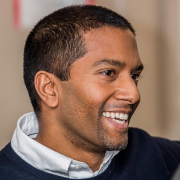Why we all need to be systems thinkers
13 Oct 2022

Dylan Mathews, Chief Executive Officer of Peace Direct
Looking at the news these days, with the wars, famines and aid cuts (and let’s not forget the unprecedented soul-searching taking place about the problems in our development sector), you would be forgiven for wanting to bury your head in a pillow and sob until it’s all over. But if you did, you would be missing something quite wondrous which has started to emerge over the past few years. People and groups are starting to talk about changing the ‘system’ and many are launching initiatives that attempt to take a systems approach to the mess and complexity we see in the world.
As with so many terms and jargon, we nod appreciatively without stopping to ask ourselves what the terms really mean. I wrote about this in relation to localization and decolonizing recently, and the same applies here. What do we really mean when we talk about systems change, and why is it so important?
Systems thinkers are notoriously bad at describing what it is they do, and what they mean. So I am going to try and give the simplest possible explanation that was taught to me recently. A system is a group of things (people, organizations, networks etc.) that are seen by someone as interacting together to do something. There you have it. International development can be regarded as a system, as it comprises many different entities interacting to tackle poverty and inequality. Peacebuilding, which is the sea I spend most of my time swimming in, is both a system in itself and also a sub-system, nested within the broader international development and humanitarian system.
This is an excerpt of a blog written by Dylan Mathews, Chief Executive Officer of Peace Direct. To read the piece in its entirety, head to the #ShiftThePower Treehouse.


